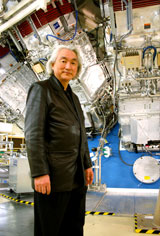Did We Know Detainees Were Innocent All Along?

In her short story “The Ones Who Walk Away from Omelas,” Ursula Le Guin imagines an almost utopian society whose existence depends on a dark secret. The inhabitants of this city’s happiness depends for some reason on keeping a single child imprisoned under miserable conditions indefinitely. When they grow up, the city’s residents are told the truth about their society. Most come to accept the injustice the city is based on. But a handful walk away from it, unwilling to live even in paradise under these terms.
A top aide to Colin Powell when he was Secretary of State under George W. Bush says the Bush administration made just this kind of calculation. In a statement he filed on behalf of a Guantánamo detainee, Col. Lawrence Wilkerson, who served in the Army for 31 years and was Colin Powell’s chief of staff, says that Vice President Cheney and Secretary of Defense Donald Rumsfeld knew that most of the 742 detainees originally imprisoned at Guantánamo had done nothing wrong, but believed it was “politically impossible to release them.” Cheney and Rumsfeld, he says, feared that releasing the prisoners would be politically damaging because it would reveal that our detention program was an “incredibly confused operation.” Wilkerson says that Cheney—who has said that keeping the the country safe is “a tough, mean, dirty, nasty business”—”had absolutely no concern that the vast majority of Guantánamo detainees were innocent.” Instead, Cheney justified holding people they knew were innocent by saying it was necessary in order to be able to detain real terrorists as well.
Col. Wilkerson is a long-time critic of the Bush administration’s handling of the war on terror and the invasion of Iraq. He has argued for a long time that the administration made no real effort to determine whether there was any reason to hold the majority of the detainees. Instead we held them—under appalling, generally abusive conditions—on the off chance that they might happen to know something useful. While Wilkerson’s claim is shocking, the truth is it has been clear to outside observers that—in spite of repeated assertions that they were “the worst of the worst”—many of the detainees were innocent and had simply been in the wrong place that the wrong time. The administration produced very little evidence to justify holding most of them, and appears to have had very little evidence. It is hard to believe to believe that Cheney and Rumsfeld didn’t know exactly what they were doing.
If holding innocent people actually would keep us safe from terrorism, many of us would be support doing it. The question of how much we can allow our own happiness to rest on injustice done to others is at the heart of politics. It’s hard to walk away from the problem entirely. But it’s also probably not an accident that in Le Guin’s fable no real explanation is given for why her city’s happiness should depend on the suffering of a child. There’s something lazy about accepting such claims at face value rather than looking for an alternative. Cheney and Rumsfeld were probably right that getting into the question of the guilt or innocence of the detainees would be politically difficult and embarrassing. So they choose to sweep the problem under the rug, along with the lives hundreds of people who had done nothing wrong. We owe it to those people not to take the easy way out, but to put in the work it takes to build a society whose safety doesn’t depend on locking up innocent people.





